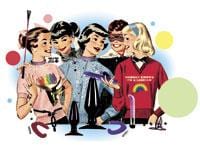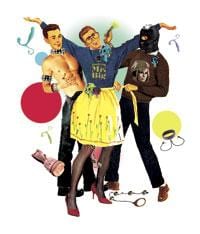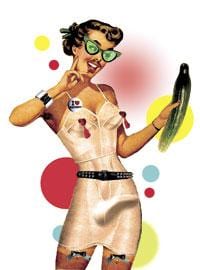
Credit: John Webster

Credit: John Webster
Youth should have access to sex toys, so why are they barred from entering most establishments that sell the merchandise?
Under Canadian law the age of consent for sexual activity is 16, while the legal age on the books for anal sex is 18, yet most major sex toy retailers, both brick-and-mortar stores as well as online shops, restrict access to anyone under the age of 18.
It sends a clear message to young people: Having sex with someone else is acceptable, but exploring your own body by masturbating with anything more than your own two hands is not.
An old Metro Toronto bylaw regulates the display of porn products, requiring them to be housed behind an opaque median and away from the curious eyes of minors. In response to this most adult stores that carry porn stop those under 18 from entering their shops so they can freely display magazines and DVDs alongside other adult items, satisfying the bylaw requirements.
But there are no laws on the books restricting the sale of sex toys, sold as “adult novelty items,” to anyone under the age of 18. Still many retailers cite an unspoken ethic that stops them short of embracing the idea of minors purchasing sex toys, even though they are legally allowed to have sex.
“I don’t think it’s an intentional double standard… They think they’re following the rules, is my hunch,” says Carlyle Jansen, owner of Good for Her.
Jansen says her understanding of the law restricts the sale of pornographic imagery in any medium to minors. “But sex toys, there don’t seem to be any regulations around who can purchase those and not. For example we allow people to bring their kids into the store or some people will come in and buy their daughter or son their first vibrator.
“I think the double standard comes out of the fact that we sort of ignore youth.”
Priape manager Ed Velasquez says minors are barred from his store because of the laws governing porn displays, but says he would not be comfortable with teens purchasing sex toys from him even if they were allowed in.
“Personally for me I wouldn’t want a 16-year-old to come here to buy [sex toys], because I would want them to expand their horizons on their own, getting to know their bodies, hopefully with someone likeminded to themselves.
“When you’re under 18 you’re just starting to find your sexuality,” Velasquez says. “You need to experiment with your own body, with what you like and don’t like, before you get into having things being put onto your body.”
Cory Silverberg, coowner of Come as You Are, a sex store co-op, says his store’s policy is not to admit anyone under the age of 18.
“In terms of youth having access to sex toys I don’t know that we have a single unified position. The fact is, we don’t card people. There’s probably people that are 17 or 19… the only reason we would card someone is if they were making trouble,” he says.
But Silverberg, like some other retailers, is conflicted about the issue. While he supports youth having access to sex toys in theory, when it comes to practice he questions if all teens would be ready to use them responsibly.
“The reason I’m comfortable with our unspoken ethical position is that without knowing our customers we have to deal with them as demographics and youth as a demographic is so varied.
“What I wish is that everyone who’s ready would have access to the tools that would help them explore their sexuality, in theory. In practice I don’t know that a retail store is well-positioned to be the arbiter of that.”
“If you’re old enough to have sex, you’re old enough to have sex toys, but saying that is different than saying it’s going to be healthy. It’s a complicated topic; just because you can have sex at 16 doesn’t necessarily mean you should.”
“I don’t think there’s a law, I think it’s that people think what they’re doing is right,” says Anne Amitay, owner of Lovecraft, a sex toy store founded in 1972.
“For years and years and years we used to have a sign on the door saying you must be over 18 to come in,” Amitay says. “We felt we had to do that.” In recent years the sign has been taken down.
“Honestly if I had a mature-looking 17-year-old or 18-year-old in here, I would have no qualms about it. I don’t think a 14- or 15- or 16-year-old is really comfortable enough yet, or mature enough, to handle being in a sex shop if they’re with their friends.”
Sarah Flicker, an assistant professor at York University who is a principal investigator of the recently administrated Toronto Teen Survey, says her research is among the first to investigate teen use of sex toys.
Of the more than 1,200 youths aged 13 to 18 surveyed, 6.4 percent of girls and 3.9 percent of boys had used sex toys, Flicker reported. Of those teens 89.6 percent had also engaged in penetrative sex. The study did not ask where the youth accessed the toys or account for the use of common household objects as sex toys.
Though teen use of sex toys seems statistically low, sex educators and activists argue the toys should be available to anyone as part of healthy sexuality or as an alternative to intercourse with a partner.
Andrew Brett, media coordinator for the AIDS Committee of Toronto, says his organization supports youth access to sex toys. “It just seems like it would be much better if young people were able to access sex toys.
“There just has to be more spaces for young people to get their hands on not just sex toys but all kinds of ways of reducing harm, and that includes access to condoms, all kinds of safe sex tools.”
Brett went on to caution that safer sex extends to the use of sex toys. “When you’re using sex toys you should still use a condom if you’re going to share them, and you should wash them between uses.”
Kim Martyn, a Toronto-based sexual health educator and author, thinks that sex toy use among teens, especially those under 16, is low.
“If they happen to come across [a sex toy] in their sister’s or brother’s drawer or their friend has one or an older person they are dating, it might be used.” Martyn also cites the financial strain many youths live with as a reason many don’t use sex toys, which range in cost from tens to hundreds of dollars.
But Martyn also has no problem with curious teens exploring their bodies. “I think they should have access because it’s not anything that’s harmful. We’re not talking about alcohol or cigarettes here, there’s no harm to be done.”
Heather Corinna, an author and sex educator who runs Scarleteen.com, an online forum for teens, argues sex toys are empowering for youth exploring their sexuality.
“I agree that the disparity with age for sex toy purchases and the age of consent is pretty kooky, particularly since masturbation not only presents no risk of pregnancy, no risk of STIs, not even risk of heartbreak, but also is something which is much more likely to help teens or adults walk into sexual relationships, when they do choose to, much more empowered in their sexuality,” she says.
For Silverberg, a veteran sex educator,the trend of parents encouraging their teens to explore sex by themselves instead of with a partner is growing. “I have had lots of friends that have asked me for advice and then bought something in conversation with their teenaged children, saying ‘I don’t want you to rush into having sex with other people,’ and I do think that it can play that role [of an alternative to sex with a partner].
“A vibrator can be as good a learning tool as a good sex-ed book, maybe even better.”
Jansen agrees. “I don’t see any issue with a 16-year-old having a vibrator or a buttplug or whatever.
“I don’t think it’s a big deprivation for a 17-year-old not to watch porn; I do think it’s a bigger deal that they can’t buy a vibrator. They might want to not have a lover and do it on their own, or they might want to use it with a lover, or they might want to explore butt play, who knows?”
Both Jansen and Silverberg give sex-education lectures to youth groups, and part of their workshop involves sex-toy education.
Jansen’s group, the Sexual Health Education and Pleasure Project, often meets with teens and university students. Though they come on an invite-only basis, Jansen says while she will answer questions on any topic, she does not immediately bring up sex toys.
“It’s tricky,” she says. “We can bring toys and if people ask about them we can talk about them. But we can’t bring them out and start saying, ‘This is a buttplug.’”
When it comes to gay and lesbian youth Jansen says the response she gets is very positive. “They really appreciate the information. They want to learn and they don’t know where to learn, especially queer youth.
“They said that all the images in the media are straight people. How does it work in the queer world?”
Silverberg’s workshops follow a similar pattern. When he is invited to speak with youth groups he comes prepared to answer any questions teens have about sex, including the use of toys.
“Talking about sex toys is more than just using sex toys; it’s about sexual response, sexual pleasure, masturbation. We’ll bring vibrators and talk about anal safety… it becomes an opportunity for people to learn something about their bodies that they didn’t already know. The most fun part for everyone is asking questions and getting to touch everything.
“Most youth in my experience aren’t that comfortable going into sex stores, and us going to them is much more comfortable because they’re in their own space, with their peers.”

 Why you can trust Xtra
Why you can trust Xtra


